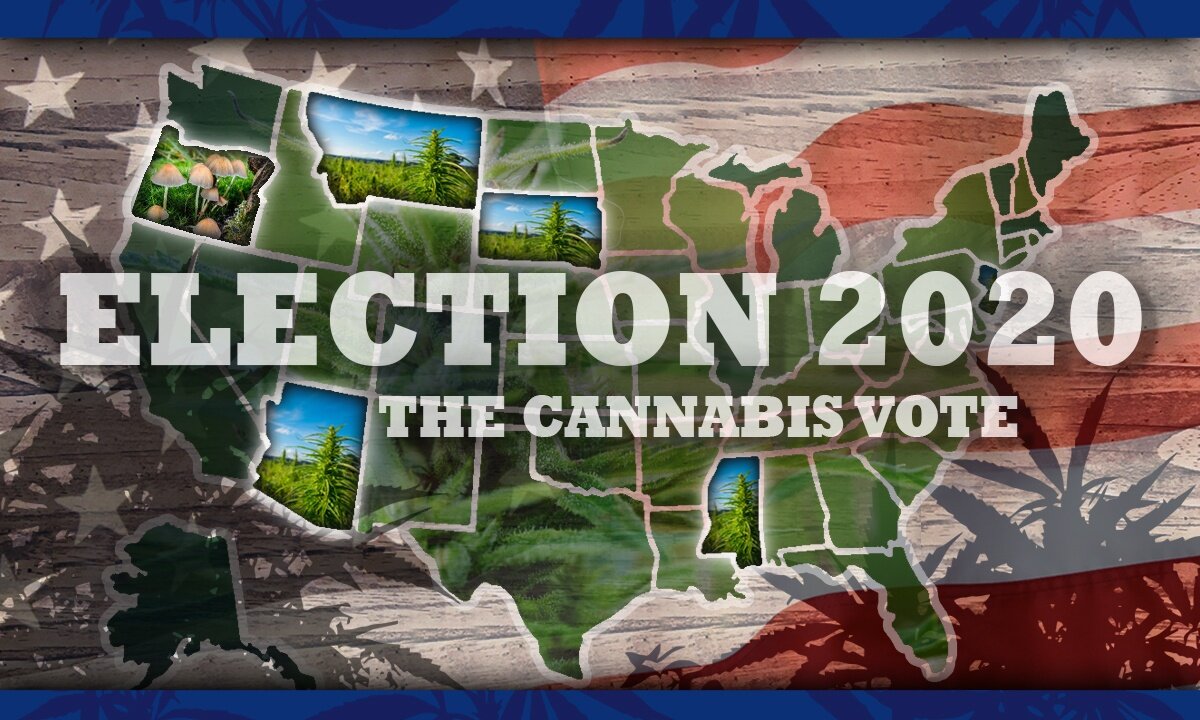Cannabis Industry Celebrates Major Election Victories; Voters Clap Back at War on Drugs
This article originally appeared on LetsTalkHemp.com
By Steven Hoffman
As the counting of votes continues to decide who won the presidential and some too-close-to-call congressional elections the day after Election Day in the U.S., cannabis industry advocates are celebrating a number of victories in key states where marijuana has been legalized, and where other drugs have been decriminalized.
In New Jersey, the Garden State, 67% of voters approved the legalization of recreational marijuana for people age 21 and over. The state commission that regulates the legal medical marijuana market in New Jersey also will oversee the new recreational market, which, according to Bloomberg News, is expected to generate $1.9 billion in sales in the state, resulting in $126 million in sales tax revenue, according to estimates from New Jersey’s Office of Legislative Services.
In all, five more states approved ballot measures legalizing cannabis use for adults, including Arizona, Mississippi, Montana, New Jersey and South Dakota. Prior to yesterday’s election, 11 states and Washington, D.C., had legalized marijuana.
In an additional blow to the U.S.’ war on drugs, voters in Oregon yesterday made it the first state to decriminalize the possession of small amounts of drugs such as cocaine, heroin and methamphetamine. “Today’s victory is a landmark declaration that the time has come to stop criminalizing people for drug use,” Kassandra Frederique, executive director of the Drug Policy Alliance, which backed the measure, told the Associated Press (AP).
Oregon voters also approved a ballot initiative making the state the first to legalize therapeutic use of psychedelic mushrooms. In addition, a ballot initiative in the District of Columbia (Washington, D.C.) to decriminalize the use of psychedelic mushrooms and other psychedelic plants and fungi appeared to have a commanding lead in yesterday’s election, reported the Washington Post.
Voter Attitudes About Drugs Are Changing
In Arizona, voters in 2016 had narrowly defeated a marijuana legalization proposal. However, attitudes have changed as the state legalized non-medical use of marijuana for adults age 21 and over. In addition, the Arizona initiative allows individuals convicted of certain marijuana crimes to seek expungement of their records, reported AP.
Despite Governor Kristi Noem’s position against hemp and marijuana, South Dakota residents yesterday voted to legalize recreational marijuana for adults age 21 and older. Voters in South Dakota passed the ballot measure by a 53-47 margin, reported Argus Leader.
In the state of Mississippi, voters approved legalizing medical marijuana, and recreational marijuana was approved by voters in Montana. The Montana measure allows for marijuana possession, use and growing among adults age 21 and older, and it also puts the state’s Department of Revenue in charge of establishing and overseeing a commercial system for growing and selling cannabis, with a 20% tax on sales, according to Vox.
According to Fast Company, the historic wins in the 2020 election for cannabis and against the U.S.’ seemingly endless war on drugs should have a positive impact on cannabis stock prices following the election. Politico reported that with the addition of five more states, one in three Americans now lives in a state where recreational marijuana is legal.
Hemp Scores Victories on Election Day
According to the U.S. Hemp Roundtable, hemp industry champions in Congress scored some victories on Election Day 2020:
Senate Majority Leader Mitch McConnell (R-KY), who led the fight for hemp’s legalization in the 2014 and 2018 Farm Bills, won reelection by a more than 20 point margin in Kentucky. As of this morning, it is not clear whether McConnell will remain Majority Leader, but even if Democrats seize control of the U.S. Senate, hemp will be secure under the leadership of Chuck Schumer (D-NY) (and McConnell will remain a powerful force as Minority Leader.)
U.S. Senator Jeff Merkley (D-OR), who has led efforts to pressure the USDA and FDA into support for the hemp and CBD industries, won reelection by a nearly 20 point margin as well.
Cannabis champion Senator Corey Gardner (R-CO) lost by a wide margin, but his victorious opponent, John Hickenlooper, oversaw one of the first successful state hemp programs in Colorado and should be an industry ally.
Reps. Kurt Schrader (D-OR) and Morgan Griffith (R-VA), lead sponsors of HR 8179— critical legislation that would open up a legal pathway for the sale of hemp-derived CBD as a dietary supplement – cruised in their reelection bids.
Reps. David Joyce (R-OH) and Earl Blumenauer (D-OR), authors of a strong letter to DEA, urging that agency to withdraw its troublesome interim final rule on hemp, won overwhelming re-relection victories.
U.S. Hemp Roundtable also reported “One sour note: longtime hemp champion, Rep. Collin Peterson (D-MN) lost a hard-fought battle for re-election in an overwhelmingly Republican district. The hemp industry owes Rep. Peterson a huge debt of gratitude for his important work on the 2018 Farm Bill, introducing legislation to protect hemp-derived CBD, and most recently, helping secure an extension for states to operate under the 2014 Farm Bill. We look forward to working with his replacement as Chair of the House Agriculture Committee,” the hemp advocacy organization said in a statement.
Read More
Hemp and Election 2020 – U.S. Hemp Roundtable
The Big Winner on Election Night? Drugs – Fast Company
1 in 3 Americans Now Lives in a State Where Recreational Marijuana is Legal – Politico
Marijuana Legalized in 5 More States this Election Day – Associated Press
# # #

